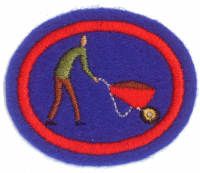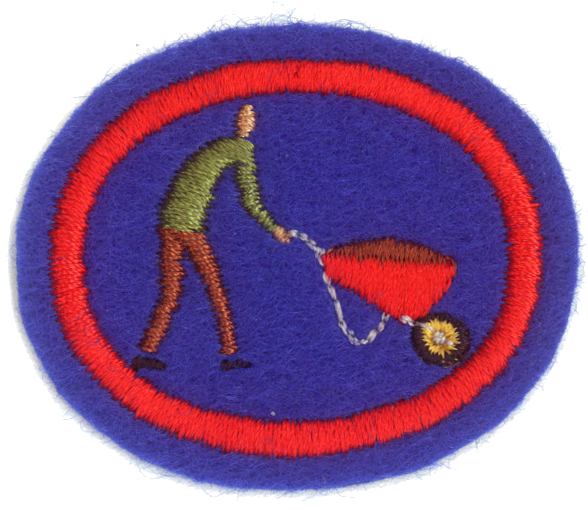Difference between revisions of "AY Honors/Community Improvement/Requirements"
Jomegat bot (talk | contribs) m (Add RequirementsHeader) |
m (- Category of Honor Requirements) |
||
| (12 intermediate revisions by 3 users not shown) | |||
| Line 1: | Line 1: | ||
| − | + | {{HonorSubpage}} | |
| − | |||
| − | |||
| − | = | + | <section begin=Body /> |
| − | |||
| − | |||
| − | |||
| − | |||
| − | = | + | <b>1. <section begin=req1 /><noinclude><translate><!--T:1--> |
| − | + | </noinclude>Be in at least 10th grade. | |
| − | + | <noinclude></translate></noinclude><section end=req1 /></b> | |
| − | |||
| − | |||
| − | |||
| − | |||
| − | |||
| − | |||
| − | |||
| − | |||
| − | |||
| − | = | + | <b>2. <section begin=req2 /><noinclude><translate><!--T:2--> |
| − | + | </noinclude>Explain the process of urbanization and list some of the human needs that it creates, especially for the poor or underprivileged. | |
| − | + | <noinclude></translate></noinclude><section end=req2 /></b> | |
| − | |||
| − | |||
| − | |||
| − | |||
| − | |||
| − | |||
| − | |||
| − | = | + | <b>3. <section begin=req3 /><noinclude><translate><!--T:3--> |
| − | + | </noinclude>Read the chapters in Ministry of Healing by Ellen White entitled “Help for the Unemployed and Homeless” and “The Helpless Poor” and write a one-page summary of the key points. | |
| − | + | <noinclude></translate></noinclude><section end=req3 /></b> | |
| − | |||
| − | |||
| − | |||
| − | |||
| − | |||
| − | = | + | <b>4. <section begin=req4 /><noinclude><translate><!--T:8--> |
| + | </noinclude>Interview a pastor, a person who works with Adventist Community Services, ADRA Canada or an Adventist community development program, and ask how the church is meeting the needs of the poor in the community. Take notes during the interview. | ||
| + | <noinclude></translate></noinclude><section end=req4 /></b> | ||
| − | + | <section begin=challenge /> | |
| − | + | <b>5. <section begin=req5 /><noinclude><translate><!--T:4--> | |
| − | + | </noinclude>Present a 10-minute report on how a youth group might help in the urban development problems the church is sponsoring. The report may be presented to a Pathfinder staff member, or it may be presented in a group setting. | |
| − | <noinclude></noinclude> | + | <noinclude></translate></noinclude><section end=req5 /></b> |
| + | <section end=challenge /> | ||
| + | |||
| + | <b>6. <section begin=req6 /><noinclude><translate><!--T:9--> | ||
| + | </noinclude>Spend at least four hours in one of the following field trips as a participant: | ||
| + | <noinclude></translate></noinclude><section end=req6 /></b> | ||
| + | |||
| + | :<b>a. <section begin=req6a /><noinclude><translate><!--T:10--> | ||
| + | </noinclude>Go out with a street ministry team that provides food, blankets or clothing to the homeless. | ||
| + | <noinclude></translate></noinclude><section end=req6a /></b> | ||
| + | |||
| + | :<b>b. <section begin=req6b /><noinclude><translate><!--T:11--> | ||
| + | </noinclude>Go out with a health screening van. | ||
| + | <noinclude></translate></noinclude><section end=req6b /></b> | ||
| + | |||
| + | :<b>c. <section begin=req6c /><noinclude><translate><!--T:12--> | ||
| + | </noinclude>Go out with a Christian work team that is repairing or building housing for the poor. | ||
| + | <noinclude></translate></noinclude><section end=req6c /></b> | ||
| + | |||
| + | :<b>d. <section begin=req6d /><noinclude><translate><!--T:13--> | ||
| + | </noinclude>Go out with a Christian work team that is repairing homes in an area that has been devastated by a natural disaster. | ||
| + | <noinclude></translate></noinclude><section end=req6d /></b> | ||
| + | |||
| + | :<b>e. <section begin=req6e /><noinclude><translate><!--T:14--> | ||
| + | </noinclude>Work in a soup kitchen or homeless shelter. | ||
| + | <noinclude></translate></noinclude><section end=req6e /></b> | ||
| + | |||
| + | :<b>f. <section begin=req6f /><noinclude><translate><!--T:15--> | ||
| + | </noinclude>Volunteer with an Adventist Community Services or ADRA Canada community development program. | ||
| + | <noinclude></translate></noinclude><section end=req6f /></b> | ||
| + | |||
| + | <b>7. <section begin=req7 /><noinclude><translate><!--T:5--> | ||
| + | </noinclude>Attend a worship service in a church made up of a different ethnic group than your own. List for your instructor the things you observed that were different than what you have grown up to be used to in your own culture. Then list the things that were similar to what you are used to. | ||
| + | <noinclude></translate></noinclude><section end=req7 /></b> | ||
| + | |||
| + | <b>8. <section begin=req8 /><noinclude><translate><!--T:6--> | ||
| + | </noinclude>Write a proposal for a community development project that could be conducted largely by teen and/or young adult volunteers. This could include objectives, action plan, personnel needed, schedule and budget. This proposal may be written by an individual or as a team project in a work team of no more than four persons. | ||
| + | <noinclude></translate></noinclude><section end=req8 /></b> | ||
| + | <section end=Body /> | ||
Latest revision as of 21:30, 20 July 2022
Skill Level
3
Year
2009
Version
17.01.2026
Approval authority
North American Division
1. Be in at least 10th grade.
2. Explain the process of urbanization and list some of the human needs that it creates, especially for the poor or underprivileged.
3. Read the chapters in Ministry of Healing by Ellen White entitled “Help for the Unemployed and Homeless” and “The Helpless Poor” and write a one-page summary of the key points.
4. Interview a pastor, a person who works with Adventist Community Services, ADRA Canada or an Adventist community development program, and ask how the church is meeting the needs of the poor in the community. Take notes during the interview.
5. Present a 10-minute report on how a youth group might help in the urban development problems the church is sponsoring. The report may be presented to a Pathfinder staff member, or it may be presented in a group setting.
6. Spend at least four hours in one of the following field trips as a participant:
- a. Go out with a street ministry team that provides food, blankets or clothing to the homeless.
- b. Go out with a health screening van.
- c. Go out with a Christian work team that is repairing or building housing for the poor.
- d. Go out with a Christian work team that is repairing homes in an area that has been devastated by a natural disaster.
- e. Work in a soup kitchen or homeless shelter.
- f. Volunteer with an Adventist Community Services or ADRA Canada community development program.
7. Attend a worship service in a church made up of a different ethnic group than your own. List for your instructor the things you observed that were different than what you have grown up to be used to in your own culture. Then list the things that were similar to what you are used to.
8. Write a proposal for a community development project that could be conducted largely by teen and/or young adult volunteers. This could include objectives, action plan, personnel needed, schedule and budget. This proposal may be written by an individual or as a team project in a work team of no more than four persons.


